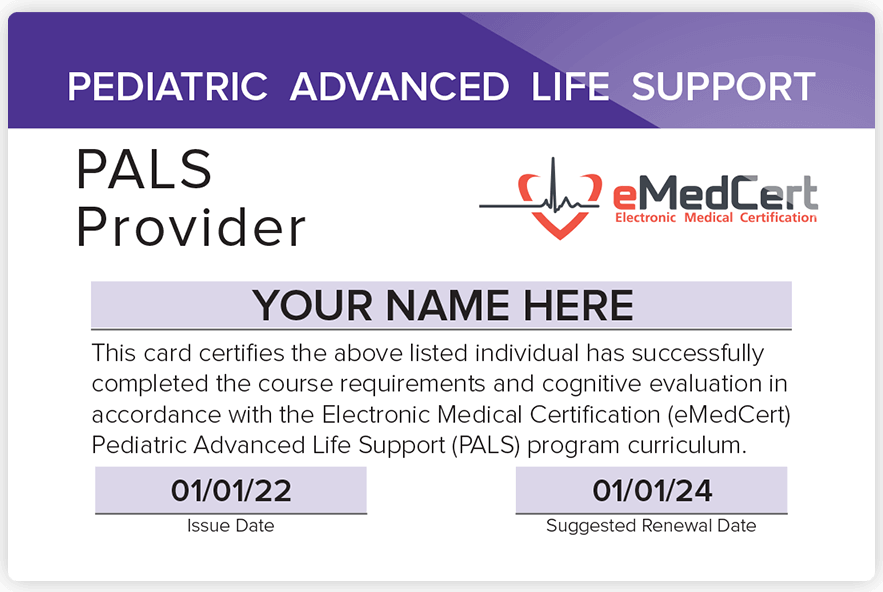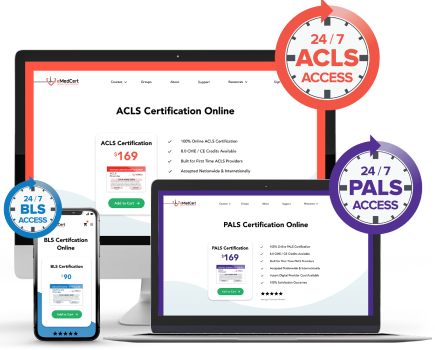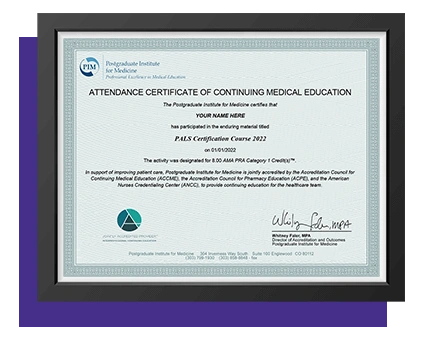PALS Training
PALS Recertification

PALS training is essential for any healthcare provider treating pediatric patients. Learn what PALS training teaches, why it’s so important, and how our fully online PALS training course can enhance your skills and prepare you to save young lives. Sign up now and get PALS certified today!

The Efficient, Affordable Way to Certify
The eMedCert Online PALS (Pediatric Advanced Life Support) Recertification course is built specifically for the demanding lifestyle required of 21st-century medical students and healthcare professionals. Our 100% online course gives you control of your PALS Certification – take it when you want, where you want, and at your own pace. Complete your course with efficiency from your desktop, tablet, or smartphone.
Credible and Affordable PALS Certification
Our Pediatric Advanced Life Support (PALS) training is accredited through our partnership with the Postgraduate Institute for Medicine (PIM) and also by the California Board of Registered Nursing (CA BRN). We provide AMA, ANCC, ACPE, and ADA continuing education credits, redeemable upon completion of the PALS Recertification course.
eMedCert and our PALS materials undergo routine audits by regulatory organizations and 3rd-party clinical teams. Our internal medical team continuously works to ensure compliance, accuracy, and integrity.

Ready To Begin?
Complete your registration and begin reviewing your material in less than two minutes. Certification has never been this easy!
Online PALS Recertification Details
Our PALS Recertification course is designed to deliver the best online certification experience that can accompany your busy schedule.
- Start When Ready -- No Time Limit -- Available 24/7
- Finish in a Single Sitting or Save Your Progress and Return Later
- Achieve a Passing Score –– 80% or Higher (32 Correct / 40 Total Questions)
- Instant Exam Results & Unlimited Exam Retakes
- No On-Site Skills Check Required
- Digital PALS Provider Card Available Immediately for Download
- 4.0 AMA, ANCC, ACPE or ADA CME Credits Available
Trusted By:





PALS Training
PALS training plays a defining role in healthcare delivery, especially in scenarios requiring life-saving skills.
But what is PALS Training? Pediatric Advanced Life Support training, better known as PALS training, is a specialized course designed for healthcare providers who may be required to deal with pediatric emergencies. This training involves practical and theoretical knowledge acquisition to help these healthcare providers acquire the skills they need to assess, recognize, and treat infants and children who suffer from respiratory and cardiac issues or emergencies. The course covers a wide range of topics, including pediatric assessment, respiratory distress, shock, cardiac arrest, and more. By completing PALS training, healthcare providers can improve their ability to provide life-saving interventions to critically ill or injured children.
At eMedCert, we are proud that our online PALS training platform allows healthcare professionals to enhance their competency in managing pediatric emergencies. With a curriculum tailored to the latest PALS guidelines, our PALS course strives to deliver the highest quality instruction via an online PALS training center, bringing convenience and flexibility to the forefront.
Aside from focusing on honing the techniques involved in performing life-saving and emergency interventions, our PALS training course also encompasses topics such as effective communication in a high-stress environment, rapid identification of life-threatening conditions, and complex decision-making under pressure.
We consistently audit our courses for accuracy and quality, ensuring that our learners receive a top-notch education that stands the test of time. We also provide an exclusive PALS Provider Manual that becomes a constructive tool for our learners, guiding them through the course and its various facets.
Related Article: ACLS Training | BLS Training
The Benefits of PALS Training for Nurses
Pediatric Advanced Life Support (PALS) training is an integral part of life support training that has proven particularly beneficial for nursing professionals.
PALS training is a crucial program that provides nurses with specialized training in managing pediatric medical emergencies. The training program emphasizes the development of skills and knowledge required to respond to life-threatening situations in children. As a result, nurses who undergo PALS training are equipped with advanced skills that enable them to make quick and accurate decisions during emergency situations. This can make a significant difference in the outcome of pediatric medical emergencies, as timely and effective interventions can often mean the difference between life and death.
The implications of PALS training for nurses are therefore significant, as it enhances the overall quality of care provided to pediatric patients, giving parents and caregivers peace of mind knowing that their children are in capable hands. As we delve more deeply into the benefits of PALS for nurses, we can understand that this rigorous program extensively improves the quality of pediatric patient care. PALS training thoroughly equips nurses with an in-depth understanding of advanced pediatric resuscitation procedures. It highlights the varied physiological responses of children to medical emergencies, enabling nursing professionals to fine-tune their approach when caring for this differently responding demographic.
PALS training can benefit nurses beyond enhancing clinical knowledge and skills. For instance, this training can foster a higher sense of confidence and competence in critical pediatric situations, significantly reducing the feelings of anxiety commonly associated with such stressful scenarios.
The availability of PALS training online for nurses has made it exponentially more accessible for these health professionals to obtain essential certifications. Moreover, online PALS training offers unparalleled convenience and a credible alternative to in-person training. Specially designed to suit the busy schedules of healthcare professionals, it allows nurses to learn at their own pace, from anywhere, eliminating the need for travel or time off work.
eMedCert’s website is an excellent example of an online provider offering certifications for nurses, such as our PALS training online. We are dedicated to ensuring healthcare professionals access high-quality, affordable, and flexible PALS training. Our courses follow the latest guidelines and adhere to the highest quality standards. We understand that nursing professionals demand the most up-to-date and accurate content to ensure they can provide the best possible care to their patients. Our courses are crafted based on advanced behavioral and medical sciences, focused on delivering practical knowledge to nurses. Our in-house PALS Provider Manual is a guiding resource for our PALS certification and PALS recertification courses, providing comprehensive study material meticulously crafted by experienced medical professionals.
In essence, the benefits of PALS training for nurses are multifaceted and can significantly improve their ability to deliver high-quality care. Providing them with an arsenal of cutting-edge medical knowledge, PALS training ensures they are adequately equipped to navigate sensitive pediatric emergencies. Hence, it is a cornerstone that further adds credibility to the overall professional image of nurses and highlights their dedication to continuous learning.
PALS Training Formats and Variations
Pediatric Advanced Life Support, or PALS, is an essential educational segment designed for healthcare professionals who directly participate in the care of children. Central to a healthcare professional's ongoing continuing education requirements, PALS training and its delivery in various formats are critical to their professional development and their ability to maintain high standards of care for their youthful patients.
An important aspect of PALS training is its versatility in format. Broadly, two principal formats exist - the PALS provider course conducted in physical learning environments and the PALS online course, which offers more flexibility in terms of accessibility and time management. Each format has unique advantages, adapting to different learners' needs and schedules.
The traditional PALS provider's course entails physical, in-person training. This format typically consists of interactive, instructor-led sessions where learners participate in simulated pediatric emergencies with the guidance of skilled instructors. The hands-on experience gained in these sessions allows learners to practice and perfect life-saving techniques in a controlled, supervised environment.
In contrast, the emergence of online PALS training has begun to reshape the learning landscape for healthcare professionals. Particularly advantageous for busy professionals, the PALS online course allows learners to obtain their PALS license at their own pace and from any location they choose.
Comprehensive and user-friendly, these courses combine the convenience of online access with the rigor and thoroughness of traditional, in-person PALS training. The online PALS course is delivered via PALS training material that typically features text, engaging illustrations and diagrams, scenarios, and a PALS pretest. The online PALS course curriculum includes pediatric assessment, Basic Life Support (BLS) review, PALS treatment algorithms, effective resuscitation, team dynamics, and more.
Online PALS training provides ample opportunity for repetitious learning, allowing learners to review complex concepts until mastery. In conclusion, the versatility of PALS training formats enables healthcare professionals to select the training method that best aligns with their learning styles, personal schedules, and employer standards in order to obtain or renew PALS certification.
Whether through traditional in-person methods or digitally via an online platform, the end goal remains consistent - to provide healthcare professionals with the knowledge, skills, and training necessary to respond promptly and efficiently to pediatric emergencies. Whether you choose a physical or an online PALS class, both must adhere to the latest guidelines and standards, ensuring a quality educational experience.
Unique PALS Training Programs and Tools
The field of pediatric healthcare is characterized by numerous challenges, which necessitate a well-rounded education and specialized training to ensure successful practice. One key area where such training is needed is Pediatric Advanced Life Support (PALS) training, which can significantly impact a healthcare provider's ability to respond to pediatric emergencies promptly and effectively.
As technology continues to evolve, so do the tools and programs available for PALS training, with some unique platforms providing an exceptional boon for pediatric life support practitioners. Various distinctive PALS training programs and tools are designed to enhance the learning experience and sustain accurate, high-quality training for healthcare professionals. These programs and tools often leverage technology to deliver engaging, interactive content that directly impacts learners' skills development, maximizes retention, and allows a seamless transition into the actual clinical environment.
PALS training videos are a popular tool among many healthcare professionals and can be very additive to this field. They are one of many tools that promote remote, self-paced learning, capturing real-life scenarios that expose practitioners to various emergencies. Clear, realistic, and easy to follow, these videos guide learners through the step-by-step processes of pediatric life-saving techniques.
Additionally, there are specific resources dedicated to pediatric life support training. These curriculums comprehensively equip practitioners with essential knowledge and practical skills in pediatric emergency medicine. Here, learners can delve into pediatric assessment, pediatric airway management, childhood illness management, and more. These programs ensure that healthcare professionals are aptly prepared to deliver both basic and advanced life support to their pediatric patients.
Pediatric life-saving techniques are fundamental elements within these training programs. Learners are taught how to distinguish symptoms quickly, make correct diagnoses, and promptly administer proper treatments. These techniques include cardiopulmonary resuscitation, defibrillation, and intubation, among others.
The training emphasizes a clear, accurate series of protocols to follow during an emergency, enhancing the professional's ability to remain calm and focused. Pediatric emergency training is an indispensable service in preparing medical professionals to handle critical situations effectively. This training helps build strong foundations for understanding children's physiological and psychological needs during emergencies. The programs are interactive, designed to simulate real-life emergencies, and equip professionals with the essential skills needed to save lives.
These unique PALS training programs and tools are distinctively based on the latest guidelines, providing the highest quality, up-to-date training material. All aspects of our online PALS courses are routinely audited to ensure they adhere to the standards outlined in those guidelines, providing learners with highly accurate, reliable resources for their professional development.